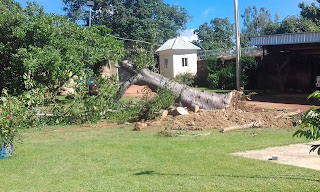The leader for the translation project walked up to me
beaming, “This activity has accomplished everything I wanted to say. I can put my computer in my bag and go home
now.” We were only an hour into the four hour program. Praise God for meeting the felt needs of this
tireless worker who is striving to see his people reached through understanding
the Gospel.
 |
| Presenting their finds on language use in the church and what needs to change. |
 |
| Zach led an audio Bible studies for the pastors who weren't from the area. The feedback was very encouraging as they saw the need and importance of audio Bible studies. |
Thankfully, the meeting arranged to help the local Pastors
know how they could use the translated Scripture had even more in store. Four men worked together before the meeting
began that morning. Even the busy chairman of the District Church Counsel was
involved. I had asked them to sing me a
traditional mourning song. I hoped they
could sing the beautiful words from 1 Peter 5:10 about suffering to the tune of
a traditional mourning song. One of the
men, Mr. Peter, who is known as a great musician said, “I don’t think I know
one.” I wasn’t sure if it was because mourning
songs were considered something Christian’s shouldn’t sing, he wasn’t old
enough to know them or some other cultural reason, but I did know that if Mr.
Peter didn’t know it, there was little hope I was going to get a mourning song
in time for the meeting. He said, “Let
me go and talk with the chairman,” and as he went to discuss with the chairman,
someone else told me, “Only women sing mourning songs, and the men just come
and comfort, men can’t cry.” He helped me understand the women sing and cry at
the same time, singing of heroes that have died, as they grieve this new loss. OK.
New plan.
I walked in the room
where they were having a lively discussion in their language about singing the
mourning songs and questioned, “Do men sing war songs?”
“Yes!” they answered.
“Ok, let’s make it a war song, then.” In two minutes the
chairman was singing a war song, everyone repeating the resounding “Oooohhhh,
Ooooohhh” in between every line. Their
bodies swaying slightly.
“Is there a dance to this?”
“No, because the men sing it when they are returning from
war or from hunting. They just walk.”
Then Mr. Peter inserted the new verse from 1 Peter 5:8, just
two verses before the one about suffering which we had originally planned to
set to a mourning song tune,
“Your enemy prowls
like a roaring lion”
“Ohhhh, Ohhhh”, the men chanted deeply in harmony,
“Seeking who he can devour,” Mr. Peter sang
“Ohhhhh, Ohhhhh” came
the answer. As they sang, they got louder, their smiles broader, their faces
more radiant.
Two hours later I introduced the song to the group, and then
Mr. Peter and the others stood up to sing.
They began, and a beautiful thing happened. All the 70 men present responded with “Ohhhhh,
Ohhhhh”, phones came out to record, the room came alive, and when I said, “Stand
up!” They all stood enthusiastically, in unison, swaying, left arms raised…”Ohhhh,
Ohhhh.” The song ended with,
“Remember our brothers around the world are suffering”
“Ohhhh, Ohhhhh,”
“Just as we are suffering”
“Ohhhhh, Ohhhhhh”
“So stand firm.”
Everyone applauded.
They had acknowledged the grief through a war song, that they are
suffering but they should stand strong.
Mr. Peter said, “We should do this with all our traditional
songs that our people sing!”
Ah, yes, the vision was cast and caught, felt and
experienced.

Please pray for the Rigwe people, especially these pastors,
as they consider how they can use the translated Scripture to impact their
language community with the wonderful Gospel that speaks to people in any
circumstance, through the ages!
 The teachers sit in groups creating learning songs and
stories. They laugh, they wonder, they
dance, they learn. Their songs are varied.
Some well polished, some haltingly sung, some on topic, some loosly
connected to the topic they were given.
Each song, though, original, fulfilling its purpose. I ask them after they have presented their
songs, “What is the greatest resource your classroom has?”
The teachers sit in groups creating learning songs and
stories. They laugh, they wonder, they
dance, they learn. Their songs are varied.
Some well polished, some haltingly sung, some on topic, some loosly
connected to the topic they were given.
Each song, though, original, fulfilling its purpose. I ask them after they have presented their
songs, “What is the greatest resource your classroom has?”  This group of teachers, coming from village areas, were very
interactive, bright, and excited.
Knowing they are facing many unnamed challenges, they were eager to
learn and become even better teachers. What a joy to be part of the training
team, encouraging these teachers who are believers in a part of the country
where they are a minority.
This group of teachers, coming from village areas, were very
interactive, bright, and excited.
Knowing they are facing many unnamed challenges, they were eager to
learn and become even better teachers. What a joy to be part of the training
team, encouraging these teachers who are believers in a part of the country
where they are a minority.




























